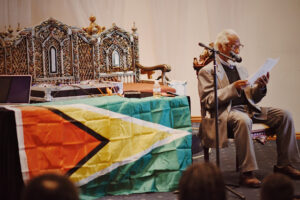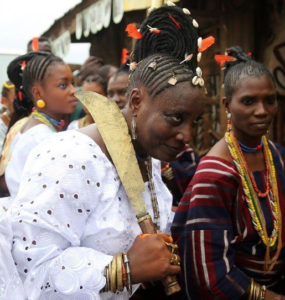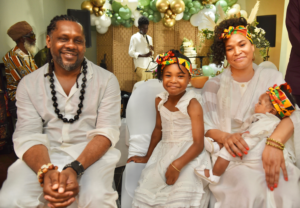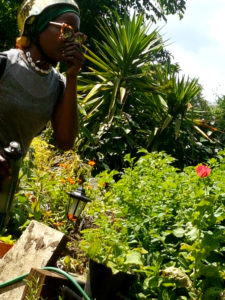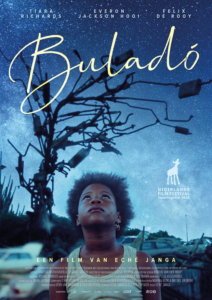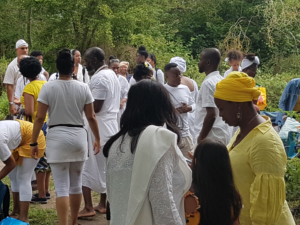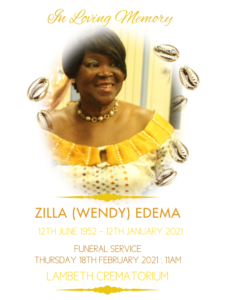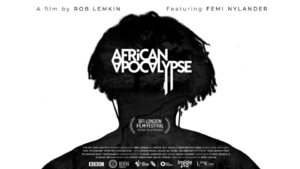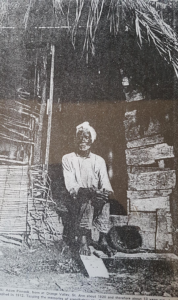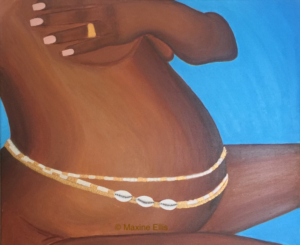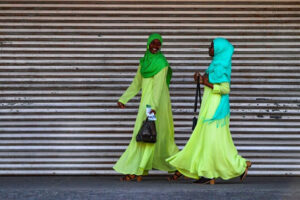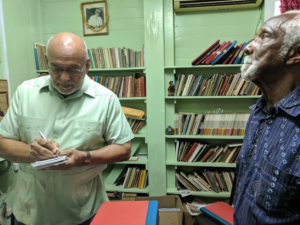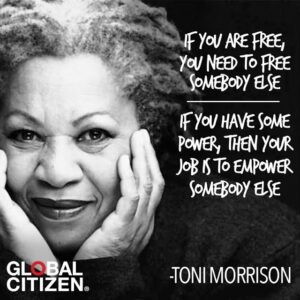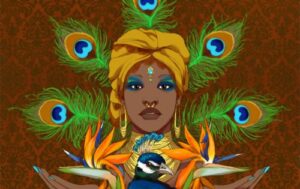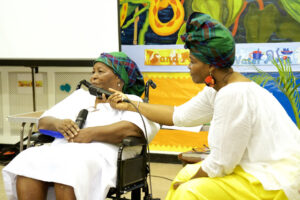
Celebrating The Glorious Cycles of Life
-
 By
Dr Michelle Yaa Asantewa
By
Dr Michelle Yaa Asantewa
- 18 minutes
- Article
- July 18, 2022
Share
For Doreen Shawyer Naming Ceremony (2) Sean, Eva, Makeda and bay Kelis. Photo Eddie Osei A few years ago, I observed that of all the life…
For Doreen Shawyer

Naming Ceremony (2) Sean, Eva, Makeda and bay Kelis. Photo Eddie Osei
A few years ago, I observed that of all the life cycle ceremonies I had ever attended I had never seen any officiated by an African. When not a religious ceremony, I didn't know the official who conducted such ceremonies was called a ‘Celebrant,’ sometimes ‘Officiant’. They are otherwise ordained Priests, Ministers or Registrars. I dreamed I could become a Celebrant and imagined how powerful it would be to infuse such ceremonies with elements of African (Black) culture.
During lockdown I started an online Celebrancy Course. I qualified in 2021 – the ‘distinction’ noted in the certificate was a boon, although after each assignment I felt I was doing something for which I must have been born. Prior to this, I'd assisted with many funeral arrangements. As a writer, I've been asked to write eulogies and I've also produced Orders of Services for family and friends – always feeling somewhat comfortable in this role. I had also observed and taken part in African naming ceremonies before doing the course; on a few occasions with a traditional Priestess and Priest.
On Saturday 2nd July, however, I officiated my first naming ceremony as a qualified Celebrant. I felt overjoyed and immensely grateful to be honoured with this responsibility. I was in my element. Indeed, over the past few months I have observed the glorious cycles of life that mark different stages of an individual's journey. From birth, with the first stage signalled by the naming ceremony through to transition (marked for instance by the Caribbean ‘nine night’ ritual preceding the funeral) each stage ought to be honoured in some way. In so doing a connection is maintained between the cosmological and natural law of cycles that we share. These rituals reinforce the unbroken cycles of culture, tradition and family bonds.
Gregory’s Sudden Passing
Although the happier celebrations took place in the last few weeks, a few months ago we were faced with the transition of 35-year-old Gregory. Shocking to all of us for its suddenness, it was remarkable to see how the community gathered to support his parents, John and Margaret, his grieving partner, and his two young children, Zane and Tia.

Gregory Orin David's Nine Night
The Nine Night ritual, which takes place before the funeral, is an occasion to welcome the spirit of the deceased into their home where we gather to celebrate their life. We grieve but the time to do this in fullness would be at the funeral. At the Nine Night, so marked because it’s believed that this is when the spirit returns to their home. We play music, games (cards/dominoes), cook and eat cultural foods (sometimes their favourites) and usually collectively made, drink and share stories about them. The idea is to signal that they can go over into the spiritual realm assured that we’ll remember them and not be so attached that we cannot go on without them. While these sessions are a lot more elaborate in the Caribbean, Gregory’s was beautiful, overspilling, as they sometimes do with folk gathered to support his family, and of course to light a candle for him so he can find his way toward the imperceptible greater light. Thus, some days later, in the very hall where we held the ritual, his son’s spirit, appearing in the form of a moth, circled the lights before gently landing on John’s shoulder. At the repast following the funeral, his father acknowledged that although it was hard to believe what had happened to his son, seeing the moth, and accepting that this was a spiritual sign of his ascension gave him some degree of closure.

John and Margaret David, thanking guests, family and community for their support at Gregory's funeral
The engagement party and Granny Doreen’s rainbow
In some remote part of me, I recall that sometimes people marked their engagement. But the first I attended was my niece's a couple months ago. I had no idea what to expect but marvelled at her happiness; surrounded by the small gathering of their families. Each celebration comes with a lot of planning and preparation that are often stressful and can sometimes lead to irreconcilable differences. But after much deliberation my niece and fiancé Joe finally knew what they wanted. With her sisters’ support in the preparations Leah looked thrilled when the day finally arrived and they could announce to all that she and partner Joe were newly engaged. While neither are big on ‘tradition’ per se – opting for a destination wedding, they appreciate the importance of introducing families, considerately bringing together culturally diverse people who might otherwise never have occasion to meet.

Leah and Joe on their engagement May 28th
Though it preceded the exceedingly hot weather we’re experiencing, the party was held in Joe’s parents’ garden, romantically decorated, and whereafter popping champagne, fireworks rang out to alert the suburban neighbours that something magical was in the air. Relatives had travelled from as far as Australia and Texas to witness the union.

Just like that Joe, one of two inherits 6 more siblings
I am so happy for my darling Leah to have found someone as devoted as her Joe with whom she can build a well nurtured home and set a foundation of enduring love for generations to come.


A couple weeks ago, days before her hen parties (held over a weekend) and as if to emphasise the drama of these cycles, Joe’s grandmother Doreen Shawyer passed away – dressing down – my mum would say. The family were hoping to celebrate her 100th birthday in September. As with the moth that revealed Gregory’s spirit in flight, we respectively observed a stunning rainbow three days after Granny Doreen’s passing and connected it to her as the bridge between the physical and material worlds, a way to pass on her blessings to the family and say goodbye. She was a radio operator during the war, with medals to show; grandson Joe said ‘she had a great life and leaves behind a legacy of happy families.’

Bride to be, Leah's hen party

Hen pamper.

Guyanese Kwe Kwe practice at Johmard Community Centre
Kwe Kwe and the gala river front wedding in Guyana
I had been meaning to re-establish the Guyanese Kwe Kwe and folk group we started a few years ago. Kwe Kwe is a pre-marital ritual that takes place on the eve or few days before the wedding. It is a chance for the couple’s family to become familiar with each other and for elders to advise the young couple, among other things, about the sexual intricacies of their union in a jovial way. We held a practice session a couple months ago that proved popular with Guyanese and others wanting to learn or be reminded of this African-derived, though uniquely Guyanese ritual. As reported by Caribbean Direct ‘we enjoyed reminiscing to folk classics like Small Days, Bamboo Fiah, Sitira Gal, Samangereh, Auntie Bess, Brown Boy, Sancho, Me Nah Dead Yet, Lily Gal and Carrie and more.”

I was therefore elated when I saw that my young cousin, Hundacy arranged a Kwe Kwe on the eve of her wedding on 9th July. Though she lives in Canada, she had travelled to Guyana to marry her childhood sweetheart. They seemed to have had so much fun, and rightly so; much of this fun lay in the risqué gestures, double entendre chants and outright challenges to the respective sexual prowess of the bride and groom and by extension their families. ‘Dem girls cyan wine’ or ‘Dacy family cyan wine’, for example, challenge the bride’s female relatives/ siblings to show how well they can wine! And ‘woman lay down and de maan na function’ with the response being ‘wha kinna maan is da’ likewise calls on the groom to show that his skills are unquestionable. All this, of course, is not about vulgarity, but generativity and regeneration. The point of the union is to reproduce children to ensure the continuity of both families. So that while ‘Open de door leh de maan come in’ appears as a literal invitation to welcome the groom into the bride's household, in the mode of double entendre it is also about positively consummating the marriage.

Bride Hundacy in her fairy-tale dress
It is unfortunate that many elders do not willingly transfer the knowledge of Kwe Kwe to the younger generation. However, I'm delighted my cousin chose to endorse her culture and embraced the ritual. Her grandmother, my Aunty Winnie had a Kwe Kwe way back in the 1950s when she was married, which my mum recalls was an enchanting affair, albeit overwhelming for her young twin sister, only 19 at the time.
And what a grand Guyanese wedding my cousin had! Adorned in her Princess style, shimmering white wedding dress with her groom dressed in a suave black and white tuxedo, the pair looked fit for the cover of a fashion magazine. The groomsmen in their pink and black tuxedo – I counted 10, dashingly complimented the bridesmaids’ elegant pink girly gowns. This made for an elaborate celebration beside the blackwater in Linden, Guyana.

Whoever caught the bouquet I don't know. But the bride has three sisters, two of whom are yet to marry, should this be their aspirations. From the serious faced baby to new bride, Hundacy Scott (her new surname), graciously walked down the aisle to declare before family and the world that she had fulfilled a dream of achieving one of the many stages in a life cycle. And I’m sure she’ll know how to mark each of these cycles with her very own style.
Elijah: Naming ceremony 1
The moment I heard his name, I knew this ceremony was divinely inspired. ‘My God is Jah.’ Or ‘my God is God’ – is the meaning of Elijah, the baby whose naming ceremony I officiated on 2nd July. As you may know, I have a special affinity with this name. It’s the title of my first novel and also my favourite biblical prophet. Along with his other names his entire beingness would be something like: ‘Son of God, whose love is beautiful.’ This, no doubt poses a huge responsibility. Yet once a child is aware of the powerful meaning behind their name, they stand a better chance to live up to it. In my novel, the protagonist Elijah had no idea what his name meant. It was given him unceremoniously. Tragically, he would wander in search of himself unaware of the power (through his name) he possessed and how he might use it beneficently. He had not been honoured with a naming and was made aware of his Africanness only when he encountered the Amerindians (indigenous peoples) who were referring to him as ‘African’ instead of by his name.
In the ceremony I conducted young Elijah was surrounded by a culturally diverse community and family.

Elijah given a slice of cake by grandmother Nenneh, held by uncle Joshua, beaming mother Emma beside

Elijah cutting his Naming Day cake, with mother Emma
He has six guide parents, collectively tasked with reminding him that he is special to each and every one of them and who pledged to support him and his mother Emma in his adventurous walk through life. Twelve sacraments, including fruits, kola nut, pepper, salt, honey, oil, corn, reflected varying experiences of abundance, struggle/bitterness, protection, sweetness, fertility on his life’s journey.
His mother became emotional as her son, long awaited, was now officially ‘brought out’ before her cherished family, friends and community. She had kept one of his names private so all were surprised when she announced one to be ‘Jamil’ to mean ‘beauty’ not just in face but character. One of the guide parents, also called Jamil, was over the moon!

With 5 of his guide parents, the over-the-moon one in black and white, far left.

In proud celebrant mode at the 'outdooring'/Naming Ceremony

Signing the Naming Ceremony certificate
The Puja: Anthony and Peri’s House Blessing
As far back as I can remember, we have always done a house cleansing prior to moving into a new home. Certainly, this would be followed by a housewarming party and periodically further cleansing to remove built up negativities brought into the home or recycled from lingering issues. My mother taught me how to do the cleansings, wiping out with special oils/washes, like ‘Chinese wash’, ‘jinx removing,’ ‘run, devil run’ etc and a blue chalk/clay (usually used for washing whites). For balance, we’d also do a ‘wipe in’ using such oils as ‘prosperity’ and ‘success’ as well as the sweetly scented aromatic ‘Florida Water’ etc. To secure and protect the home from negative vibrations we would put a pinch of salt in the corners after wiping out. This ritual we still do on old year's night (New Year’s Eve here) and wipe in for abundance prosperity, peace, joy, love, etc., a week later. As we do these rituals we pray and ask those unwanted energies to leave. We use candles and incense as part of the cleansing and blessing.

Anthony and Peri blessing themselves and guests at their Puja

Acknowledging four cardinal points (East, West, North, South)
So I was delighted when my nephew Anthony and his wife Peri held a Puja on 3rd July to bless their new home. This involved lots of prayers recited in Gujarati (with occasional Hindi) by two Priestesses and an assistant. Few understood what the prayers were, but one of the Priestesses would try to explain in what little English she could. I recall her saying they were for different forms of protection, not only for the house, but for the inhabitants, husband and wife as well as their children. Some, however were for cleansing (internal/external). They were asked to splash themselves, head first with water and then splash their guests, which was both cleansing and purifying. At another time, they'd brush the smoke from a small wood fire that was lit in the centre of the ritual over themselves, again for protection. The fire was one of the four elements into which we would all be invited to throw a mixture of cowpat (didn’t know this at the time! Cows and all parts thereof being sacred to Hindus) and wood and repeat a chant at the end of a recitation that was said in Gujarati. This process lasted a good time, as most of us gathered were asked to take part. The fire raged and set off the fire alarm but its embers/power/force were used for protection, ascending and spreading throughout the home.

Feeding the fire

New start
All this was done before a beautifully decorated shrine comprising Lord Ganesh, who is referred to for all new ventures (home, job, car etc.,) and Durga Maa, who is the Protective Mother of the universe (Peri explained that all such rituals would include a ‘Mother’ icon). We walked around the shrine, dipping respectfully and humbly when we came before these icons. Some who could speak/understand Gujarati sang with the Priestesses, the rest of us clapped rhythmically.

Dressed in their traditional saris, such a fabulous array of colours could only uplift the spirits and announce to the protective energies in the new home that this will be a home sweetened with gaiety, love and warmth. However, I recognised a small nut much like our African bitter kola, there to remind that all will not always be sweet because inevitably there would be some distaste/bitterness that must be balanced with the sweetness – represented by cubes of brown sugar. Towards the end, there was a sweetened/spicy milky drink, which Peri, Anthony and others drank to further establish this sweet and nourishing balance.

With Peri's proud mum and dad

Proud mum Kathy and son Anthony
By this ritual it was expected that love, prayer and understanding would always be the foundation of their home and relationship. It was an emotional and proud moment – to witness my nephew's achievement of having his own home. Although it tested our patience, due to long floor sitting (folding in and out of awful lotus postures), unending prayers during which I overheard a young cousin ask, “are they (the Priestesses) reading the whole book,” and the belly rumbles because we were fasting, it was an absolutely beautiful ritual to be part of.
It reminded me of the longed-out thanksgiving ceremonies my mum used to do with various parts preceding the food we all longed for. After about four hours we feasted on sumptuous homemade vegan/vegetarian cuisine – lovingly made by Peri’s mum, aunt and uncle. Of course, we had by this time already fed the ‘gods’, as would be customary when we Africans do our rituals.


Taking the Stage: Shawana’s graduation
One of the most difficult life cycle periods is formal education. Some children run towards the school gates when they start nursery. Others coil up for a while and blossom at primary. But over time when they advance to secondary and tertiary the parental cushioning is relaxed, and they have to face this new phase somewhat alone. I know my mother didn't know half the things I had to put up with at school and then University. And I’m sure it’s the case for many children.


With parents Arti (Zuba) and Pauline

With Keiron
I was asked by her parents to mentor young Shawana as she was finishing secondary school. This is one of the best experiences with a young person I've had over the years. Shawana has a gorgeous old soul. And immediately we struck a bond that years later, she asked me to join her family to see her graduate from university, on 5th July. There had been many obstacles toward this path however. She persisted through difficulties at her first university and having to switch, through pregnancy, becoming a young mother to beautiful baby girl Zion, to leaving home and moving in with her supportive partner Keiron; and no less the trials of the pandemic which might have made her course seem obsolete. She wanted as many members of her family to be present at her graduation. She recognised the importance of the achievement, knowing the trials she had endured to get there.

All the family, behind and beside to support Shawana
From the overspill in one of the lecture theatres, we waited for her to take the stage. Dressed in a gorgeous African print gown, she glided across the stage like a graceful Swan, and lit up the otherwise mundane ceremony. She might not have heard our buoyant cheering but she surely knew that each of us were super proud of her. We have every confidence she will go on to greater successes in her life, not least because she wanted to celebrate in a style that represented her African ancestry, setting a precedent for her future by honouring her past. She asked us all to join her in this honour by wearing a piece of the same cloth. As observed by other families at the graduation, whom we well outnumbered, this reflected unity and oneness in support of this beautiful young woman who is a credit and inspiration to us all.

Off with the old hat, welcome the new

Eva and Kelis: Naming Ceremony 2
A week after conducting the naming ceremony for Elijah, I participated at another; only this time I was one of the god/guide parents. It was officiated by Priest AnkAnum, who has been doing such life cycle ceremonies in the UK since the late 80s. This double naming ceremony for Eva and Kelis was ‘amazing’ to quote mother Makeda. After a brief introduction, the Priest hailed the elders that comprised grandparents, big sister, and great grandfather, 92-year-old Baba Eric Huntley. The ceremony involved the community witnessing the love and respect for the children being brought ‘out’ to play their part in the wider development of the family. We were given a piece of fruit and a tiny bit of kola nut, representing abundance, the sweetness of life and bitter experiences to overcome. The children would also be given something sweet and sour to symbolically sample these balancing experiences.

Priest AnkAnum: Photo Eddie Osei

Water splash from maternal Grandmother

Eddie Osei Photo

Godparents, Corrie, Omega, Michelle
As with the Puja, we were spruced up with water as the primordial source of life. Anointing the children with oil fell, not to the priest as conventionally in European tradition (such as Christenings) but to the elders and parents. In this way the responsibility of ensuring the child's sacred connection is ancestrally and culturally enshrined. Their names were whispered in their ear, with pledges said aloud (or privately) by parents and elders before revealed to us, the community/family.

Happy Sean celebrating with family and friends: Photo Eddie Osei
Eva, the eldest child, who had not had an earlier naming ceremony has been a blessing and gift as my goddaughter for a couple of years. The spiritual intervention that led to me being her godmother is too long for this article but I know it carries great responsibility, no less because it was given that spiritual assent by her great-grandmother Mama Jessica Huntley. But this was occasion to become familiar with her African name, fittingly ‘Ayokunnu’ meaning ‘full of joy’ and also to more formally acknowledge that I’m one of the godparents. I didn't imagine I could luck out twice, but I was also asked to be one of the godparents to her sister, five-month-old Kelis – I call her Ruby, after her paternal grandmother and her second name. She is so ole lady like and chunky cuddly. ‘Omalola’ – her African name refers to the wealth she brings, literally and spiritually. Aren’t these names beautiful?

Elders representing each family. Photo Eddie Osei
Sean and Makeda, their parents were asked to say why they chose the names for the children. Their decisions were based on observing endearing qualities in the names, both have middle names of female ancestors with whom they’ll have a strong spiritual connection. Likewise, they explained that the guide parents had respective qualities of nurturing, wise, free spirited, spiritually grounded, loving and kind. We know it takes a village to raise a child, as the proverb goes, hence their families and community in general are also responsible for every child’s upbringing. This means the community must exhibit mutual respect, something I’d expressed at the previous naming ceremony; the ability/readiness to reconcile differences and thus have the wisdom to always act in the children’s best interests. The children in turn are guided to uphold the values of their families and communities, and supported to be successful in all their pursuits. It is a huge responsibility for sure, but it's not a lone mission but a collective endeavour. As such, their other godparents are Corrie, Elisha, Omega and Shaka; all are thrilled to be asked to take on this role.

Though I didn't get to read the excerpt from Of water and the Spirit by Malidoma Somé, it's worthwhile to quote here. For the Dagara (of Burkina Faso) according to Somé ‘every person is an incarnation, that is a spirit who has taken on a body. This world is where one comes to carry out specific projects. A birth is therefore the arrival of someone, usually an ancestor that somebody already knows, who has important tasks to do here.’ Unborn ancestors, he says are ‘expressed in the life of nature, in trees, mountains, rivers and still water.’ They do a ‘hearing’ ritual a few months before the child is born. The pregnant mother, her brothers, and grandfather gather before a priest (the father doesn’t attend) to hear from the spirit of the child such things as its totems, why he/she is coming, why they chose their gender, and so on. I’m fascinated by this magical process, which involves the pregnant mother falling into trance to relay the messages. The point is that the child should not forget his/her purpose upon arrival. After all, ‘a name is the life program of its bearer’ (1994:20).

Drummers delight

After about two wholly enchanting hours the ceremony ended. Though Sean and Makeda had no idea what to expect, Makeda was ‘beaming’ several days later and declared the occasion ‘priceless.’ We bubbled to some excellent DJing at the end, but before that the ceremony was interspersed with drumming (by grandfather Chauncey and his Akindred spar Desmond); the flute playing at the outset by Priest AnkAnum was a wonderful touch, and the interlude piece by their cousins Zachary (on the clarinet) and Tafari was so special.
I am blessed to be variously called God/guideparent and sponsor to children whom I feel chose me, their parents being conduits of some kind of metaphysical negotiation and exchange. Indeed, I do not count these many blessings but say, as per a Yoruba proverb cited by Wole Soyinka that ‘the gods have been kind to me.’
After both naming ceremonies the food served was outstanding!

Sisters celebrating


This and above photos Eddie Osei
Michelle Yaa Asantewa Celebrant
I couldn't let these remarkable and co-timely celebrations pass without this tribute. I look forward to being part of many more rituals that celebrate the magnificent cycles of life. As I too take up this new venture as a celebrant, it will give me the utmost joy to support such rituals as ceremoniously naming a baby/child, coming of age, marriage/commitment services, renewing vows, blessing/cleansing new homes, sending home rituals and funeral rites etc., by creating wonderful memories that are rooted in culture, family, togetherness and importantly enduring love. For these rituals are indeed priceless. They empower the wellbeing of the individuals and help maintain the integrity of the families and the new relationships built around them.





